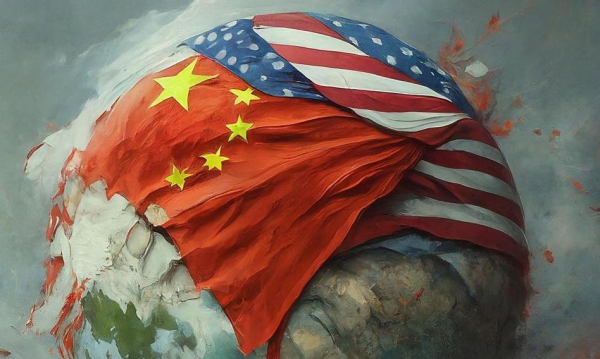The Chinese government has approved raising retaliatory tariffs on goods imported from the US from 34% to 84%, the Ministry of Finance in Beijing announced on Wednesday. This is a response to the US administration's implementation of tariffs at the level of 104% on imports of products from the PRC. Additionally, the Ministry of Commerce announced separate sanctions on entities from the US.

The duties announced by the Tariff Commission of the State Council (Government) will be effective from April 10 at 12:01 local time (6:01 in Poland).
The finance ministry said in a statement that apart from increasing the tariff level to 84 percent, “other issues” related to “retaliatory tariffs” are being implemented in line with a notice issued on April 4 on tariffs.
China then announced 34 percent tariffs on all U.S. goods, to be added “to the existing tariff rate.”
US contracts drop significantly after China's retaliatory tariffs
US futures are down sharply, as are European indices. Markets are risk-averse following the entry into force of US import tariffs, as well as China's announcement of retaliatory tariffs on US imports. Bond yields are rising sharply, the dollar is weakening, and oil prices are falling sharply.
S&P 500 futures are down 2 percent, Dow Jones Industrial is down 2.26 percent and Nasdaq Comp. is down 1.78 percent.
Apple shares are down 1.5% in premarket trading. Ford Motor is down 3%, while General Motors is down 2.5%.
Banks are also losing ground. JPMorgan is down 2.5% pre-market, Morgan Stanley is down more than 3% and Goldman Sachs is down 3.5%.
Delta Airlines is down 0.2% in premarket trading after beating first-quarter profit estimates, despite the impact of uncertainty over fares on travel demand.
Walmart shares are down 1% in premarket trading after the retailer withdrew its first-quarter operating profit forecast due to Trump's tariffs.
Bitcoin is down 0.5 percent and is trading at $76,287 per token.
The VIX index, a measure of expected volatility and a sentiment assessment instrument, is up to 57.33 points.
In Europe, the Euro Stoxx 50 index is down 4.20 percent, the German DAX is down 4.20 percent, the French CAC 40 is down 4.16 percent and the British FTSE 100 is down 3.69 percent.
The benchmark Europe Stoxx 600 index is down 4.62 percent.
The exception, it said at the time, is goods that were shipped to China before April 10 and will be imported by May 13. The finance ministry also stressed that “there will be no exemptions or reliefs with respect to the imposed customs duties.”
“The US tariff escalation against China adds insult to injury, gravely infringing on China's legitimate rights and interests and seriously undermining the rules-based multilateral trading system,” the finance ministry said in a statement on Wednesday.
At the same time, the Chinese Ministry of Commerce issued three separate announcements. The ministry announced that it had filed a lawsuit against the United States under the WTO dispute settlement mechanism over the tariff increase.
The ministry also said that six American companies had been added to the list of unreliable entities “due to their involvement in arms sales to Taiwan and military-technical cooperation with Taipei.” The sanctions included the American aviation corporation Sierra Nevada Corporation and Cyberlux Corporation, one of the suppliers of military equipment and systems.
The potential for bilateral escalation in the US-China tariff conflict has essentially run its course. Tariffs have reached prohibitive levels (for most goods). Any further increases will therefore be of only symbolic importance.
Now the key issue is closing the back door…— Maciej Kalwasiński (@MKalwasinski) April 9, 2025
In addition, the ministry has placed 12 US entities on an export control list, which limits the export of dual-use products to them. The ministry has named American Photonics, Novotech Inc. and Marvin Engineering Company Inc. “These entities are behaving in a manner that may threaten China's national security and interests,” the ministry said in a statement.
At one minute after midnight EST, increased tariffs went into effect on goods from countries with which the United States has a trade deficit. Including previously imposed tariffs, goods from China will face a 104% tax starting Wednesday . This includes low-value packages, which Chinese e-commerce platforms like Temu and Shein have relied on, although in that case the tariff is 90%.
US Treasury Secretary: China's Escalating Move on Tariffs Is Their Loss
The Chinese government's escalatory move to raise tariffs on U.S. imports to 84 percent on Wednesday is its loss, U.S. Treasury Secretary Scott Bessent said in an interview with Fox News. He added that China is “the biggest criminal in the international trading system.”
“I think it's unfortunate that the Chinese don't really want to come in and negotiate because they are the worst offenders in the international trading system,” Bessent said in an interview with Fox Business Network.
He reiterated that the United States should reduce its trade deficit with China. “The United States is trying to move toward greater production. China needs to move toward greater consumption,” he noted.
Bessent warned Beijing against trying to devalue the yuan in response to US tariffs. “If China starts devaluing, then (…) everyone will have to raise their tariffs to balance it out. So I would urge them (China – PAP) not to do that and to come to the (negotiating) table,” Bessent said.
The Chinese government decided on Wednesday to raise retaliatory tariffs on goods imported from the US from 34 to 84 percent. This is a response to the implementation by the US administration of tariffs of 84 percent on imports of products from the People's Republic of China, which increased the total rate for this country to 104 percent. (PAP)
mws/ akl/
From Beijing Krzysztof Pawliszak (PAP)
krp/ ap//






